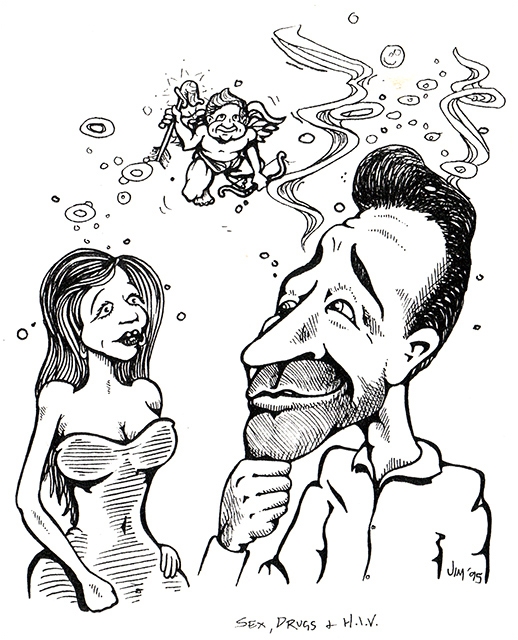Sex, drugs, HIV & AIDS
Sex, drugs, HIV & AIDS
The Human Immunodeficiency Virus – HIV – is the virus that may lead to the development of Acquired Immune Deficiency Syndrome, or AIDS. AIDS is everybody’s concern. This page contains important information about HIV and AIDS, and how to reduce the risk of infection to a minimum.
What is HIV?
HIV is a virus that affects the immune system of the human body. Someone who has been infected by HIV may appear and feel healthy, but they can pass the infection on to others.

Love, sex and relationships
What is AIDS?
People who have been infected by HIV are prone to other infections – their body’s natural defence system is weakened. Sometimes a mild illness can become more serious or an infected person may develop an illness that is usually rare. Contracting several of these opportunistic infections (or one of a number of specific infections) in the presence of HIV is the reason for a diagnosis of AIDS.
So, how do people get HIV?
HIV is passed between people in three main ways
Through unprotected sexual intercourse with an infected person. ‘Unprotected’ means that there is an exchange of body fluids at some point. ‘Sexual intercourse’ may be penetrative or not, with someone of the opposite sex or the same sex, vaginal, anal or oral.
By sharing injecting equipment with an infected person. ‘Injecting equipment’ includes needles, syringes, water, spoon, filter – any thing that may have had any contact with blood of the other person. HIV doesn’t discriminate between the substances that are being injected – steroid users and heroin users share the same level of risk.
From an infected mother to her baby.
HIV has been passed on through blood products (like factor 8 which is used in the treatment of hemophilia), although now in the UK all blood products have to be screened before they can be used. Sharing injecting equipment may take place by accident – being stuck by a discarded needle for example. Any situation where body fluids can be exchanged carries risk – wiping up a spill of any body fluids should not be attempted without adequate protection.
OK, so how do I reduce the risk of infection?
People who are carrying HIV infection can look and feel healthy – they may not be aware of the infection themselves. All of the following steps should be taken to minimise the risk of infection: Always use an approved condom (for example a British Standard ‘kite marked’ brand) for any type of sexual intercourse. Condoms are available free from family planning clinics.
If you use a lubricant, never use an oil based one (like baby oil or Vaseline) as these can dissolve latex and cause condoms to break. If you use drugs and are injecting, always use a clean set of works. Needles and syringes are available free from needle exchanges including the SWOP scheme (through participating pharmacists). Remember, HIV and other infections can be passed on if you share any injecting equipment. If you use drugs (including alcohol) and aren’t injecting, your judgement may be affected – you may be more likely to engage sexually with another person or may decide that you don’t need to use a condom. Sex and drug use don’t always mix – some drugs will inhibit erection or orgasm, others may reduce sexual interest.
Always carry a condom and if you do have sex with someone else remember to use it! Many substances affect the human immune system; if you are using drugs you may well be more susceptible to all kinds of infections that a healthy immune system would fight off. If you aren’t eating or sleeping properly, or you’re suffering from stress for any reason then you are also less likely to fight off infections that you come into contact with.
Anything else?
There has been a lot of fear about HIV and AIDS. Some of the things you may have heard about the virus will be true, and some will be based on misinformation, myth and rum our. By learning about HIV and AIDS you can separate myth from reality, and reduce the risk of catching or passing on HIV. These immune system dysfunctions have only recently been discovered and researched, and the use of drugs, an individuals lifestyle, diet and a history of chronic infections may be just as important precursors to AIDS as sexual behavior – if your immune system is not working properly you are less likely to be able to fight off viral infections whether they are sexually transmitted or not. Certainly people who become infected with HIV who lead otherwise healthy lives can stay well for longer.
